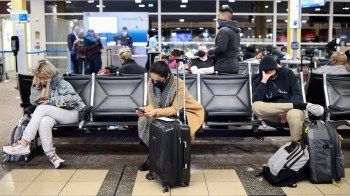Where is East Germany, 20 years after reunification?
TEXT OF STORY
Bob Moon: There’s an old saying: “Be careful what you wish for.” Take, for instance, the declaration President Ronald Reagan made when he visited what was then West Germany:
Ronald Reagan: Tear down this wall!
The wish soon came true, of course. And during the past year, Germans have been celebrating 20 years of unity. The re-marriage has been expensive, though. At least $1.7 trillion has been spent in the formerly Communist east, modernizing a dilapidated infrastructure and invigorating the economy.
And after two decades, the euphoria has worn off. Kyle James looks at one city that’s still struggling to remake itself.
Kyle James: This old newsreel praises factory workers in the East German towns of Wolfen and Bitterfeld. It doesn’t mention that those workers were toiling in one of the dirtiest corners of Europe. The twin towns were the center of East Germany’s chemical and mining industries. Environmental protection? Forget it. Resident Matthias Gabriel remembers sitting on a park bench one day in the 1960s.
Matthias Gabriel: I got stains on my pants that wouldn’t come out and after a few weeks, they turned into holes. The place just stank, it was always foggy with chemical fumes. If you could imagine what hell looked like, that was it.
Bitterfeld and Wolfen were the epitome of a failed East Germany. Tens of thousands lost their jobs as uncompetitive factories were shuttered after the Berlin Wall fell. Almost half of the population simply left.
Today, town spokeswoman Katrin Kuhnt walks up the ramp of the Bitterfeld Arch. It’s a new steel sculpture with a 90-foot-high observation deck. From the top, instead of an industrial wasteland, you see a sparkling lake created from an old mining pit. There’s a marina and several new restaurants.
Katrin Kuhnt: I think we are a town which is the best example for change. Change from a destroyed environment to a tourism attraction.
There’s also a forest with biking trails next to a town that still has smokestacks, but that’s largely been scrubbed clean of ash and soot.
Kuhnt: We have a well-functioning environment and we have a lot of tourists here. We have industry too, but it’s clean industry.
A handful of solar companies have set up shop in the region. Konrad Sell works at one of them, Sovello. On the factory floor, robots attach frames to solar panels.
Konrad Sell: We have an industry and a branch proceeding at a pace you would not have imagined when the wall came down 20 years ago.
But real problems remain. The town’s buildings might be renovated, but at 6 P.M., downtown is almost devoid of shoppers. There are real concerns about the town’s long-term economic outlook. Petra Wust is the mayor.
Petra Wust: In these modern factories, you just don’t need as many people. We will never have as many industrial jobs here as we once did. It’s just not going to happen.
Today, there are only about half of the jobs there were in the 1980s. Unemployment remains high, and young people continue to leave. Like many towns in the former east, Bitterfeld is shrinking. Miriam Muller of Berlin’s Free University says that’s led to disillusionment.
Miriam Muller: In the smaller towns you can somehow feel a kind of anger in the people. They feel disappointed by the politicians. What they had expected from western Germany was Utopia.
What they got was capitalism. And even two decades later, many have still not come to terms with it.
In Bitterfeld, Germany, I’m Kyle James for Marketplace.
There’s a lot happening in the world. Through it all, Marketplace is here for you.
You rely on Marketplace to break down the world’s events and tell you how it affects you in a fact-based, approachable way. We rely on your financial support to keep making that possible.
Your donation today powers the independent journalism that you rely on. For just $5/month, you can help sustain Marketplace so we can keep reporting on the things that matter to you.


















